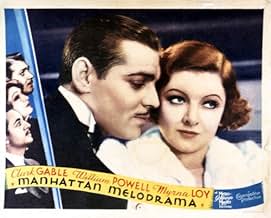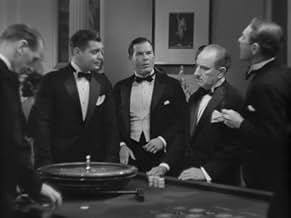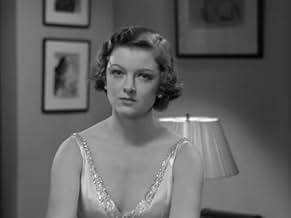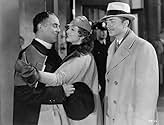CALIFICACIÓN DE IMDb
7.1/10
5.1 k
TU CALIFICACIÓN
La amistad entre dos huérfanos perdura a pesar de que crecen en lados opuestos de la ley y se enamoran de la misma mujer.La amistad entre dos huérfanos perdura a pesar de que crecen en lados opuestos de la ley y se enamoran de la misma mujer.La amistad entre dos huérfanos perdura a pesar de que crecen en lados opuestos de la ley y se enamoran de la misma mujer.
- Dirección
- Guionistas
- Elenco
- Ganó 1 premio Óscar
- 4 premios ganados en total
Thomas E. Jackson
- Richard Snow
- (as Thomas Jackson)
Isabelle Keith
- Miss Adams
- (as Claudelle Kaye)
Oscar Apfel
- Speaker of Assembly
- (sin créditos)
William Arnold
- Blackjack Dealer
- (sin créditos)
William Augustin
- Detective
- (sin créditos)
Opiniones destacadas
They didn't name this "Manhatten *Melodrama* for nothing - it's classic melodrama! If you can get past the first fifteen minutes or so, what saves this film is the three leads: William Powell, Clark Gable, and Myrna Loy. As a Myrna Loy/William Powell fan, I love the whole scene from their first meeting, as she flings herself into his taxi, and he thinks she is out to wreck his career by pretending he assaulted her! Clark Gable is great as the charming bad guy, too. Of course, in this story about unpunished crime vs. betraying a friend, nobody ever considers the third way, but then it wouldn't be a melodrama anymore, would it? Anyway, if you enjoy golden oldies or any of the three main actors, it's worth watching.
Well, unusual for me. Perhaps at the time, the circumstances, what have you, it was not so unusual. But for me, watching Clark Gable portray a happy-go-lucky double murderer, who garners tons of sympathy from the audience; it was a first.
Manhattan Melodrama is a film of dubious and rather interesting morals. Who's the hero? Who's the villain? Childhood friends Jim and Blackie grow up very different men, Jim becomes DA of New York City, while Blackie runs a casino, and performs other unsavory activities. Eventually, their positions force them into conflict, but it's not your typical run-of-the-mill courtroom drama.
Blackie in most films would be a villain, he is after all a gangster and a murderer, amongst other activities. But here he's played by Clark Gable, about as charming an actor as ever lived, and the movie takes place in the 1930s, when gangster pictures like Little Caesar elevated these types of men into hero roles.
The picture makes a very blatant message against the heroic vision of gangsters (In a speech by Jim that feels as if the men who controlled the Production Code were standing off screen holding the cue cards for him). But I couldn't help feeling sympathy for the character, after the evil deeds he did. Meanwhile Jim, a hardworking individual who is uncorruptable, comes off as "cold" by the end of the picture. The way this movie sidesteps conventional roles is really interesting.
The lead woman in the picture, Eleanor, is rather interesting too. Watch how she jumps back and forth and between the men, and for what reasons.
I don't fully understand this movie, and it's not one of the most exciting films I've ever seen, but it's one of the most interesting ones I've seen in quite a while.
Manhattan Melodrama is a film of dubious and rather interesting morals. Who's the hero? Who's the villain? Childhood friends Jim and Blackie grow up very different men, Jim becomes DA of New York City, while Blackie runs a casino, and performs other unsavory activities. Eventually, their positions force them into conflict, but it's not your typical run-of-the-mill courtroom drama.
Blackie in most films would be a villain, he is after all a gangster and a murderer, amongst other activities. But here he's played by Clark Gable, about as charming an actor as ever lived, and the movie takes place in the 1930s, when gangster pictures like Little Caesar elevated these types of men into hero roles.
The picture makes a very blatant message against the heroic vision of gangsters (In a speech by Jim that feels as if the men who controlled the Production Code were standing off screen holding the cue cards for him). But I couldn't help feeling sympathy for the character, after the evil deeds he did. Meanwhile Jim, a hardworking individual who is uncorruptable, comes off as "cold" by the end of the picture. The way this movie sidesteps conventional roles is really interesting.
The lead woman in the picture, Eleanor, is rather interesting too. Watch how she jumps back and forth and between the men, and for what reasons.
I don't fully understand this movie, and it's not one of the most exciting films I've ever seen, but it's one of the most interesting ones I've seen in quite a while.
Solid MGM crime drama that is best remembered today as the film John Dillinger saw just before being gunned down by federal agents. The story is a simple one about two men (William Powell, Clark Gable) who grew up together but are on opposite sides of the law. Myrna Loy also stars as the woman initially with Blackie (Gable) who falls for and marries Jim (Powell). Great director and trio of stars with fantastic chemistry elevate this above otherwise banal plot. Young Blackie is played by, of all people, Mickey Rooney! Must've been one hell of a puberty. Also of note is the song "The Bad in Every Man," sung by Shirley Ross here. The song would later be given new lyrics by Lorenz Hart and become the classic standard "Blue Moon."
From what I can gather, two main social factors led to the popularity of the gangster genre in the 1930s. The first, and most obvious, was the prevalence of criminals like Al Capone and John Dillinger, who were glorified by the national media. The second was the Great Depression, and how it impacted the traditional notion of the "American dream." Families – regardless of character or social standing – were torn apart amid the economic collapse, and no doubt many ordinary citizens contemplated crime as the route to happiness.
Films like 'Manhattan Melodrama (1934)' and 'Angels with Dirty Faces (1938)' place great emphasis on the thin line between "good" and "bad" characters, and often the central criminals are lamented as victims of circumstance. For example, James Cagney's Rocky Sullivan and Pat O'Brien's virtuous priest were separated by a matter of metres when the former is condemned to a life of crime. Circumstance, too, drives the fates of the characters in 'Manhattan Melodrama.' As children, both Jim Wade (William Powell) and Blackie Gallagher (Clark Gable) lose their parents in the burning of the steamship SS General Slocum, a true-life disaster caused by gross negligence that cost over 1000 lives. Each child responds to this injustice in their own way: Blackie rebels against the judicial system that betrayed him, whereas Jim enters law in a bid to reform it.
Whereas Warner Bros. was responsible for most of the decade's gangster films, 'Manhattan Melodrama' was produced by M-G-M, and helmed by W.S. Van Dyke (director of the first four 'Thin Man' films), whose decidedly non-gritty aesthetic style at first seems at odds with the required mood. However, it would be misleading to compare the film with the likes of 'Little Caesar (1931)' and 'Scarface (1932).' Firstly, Hollywood was now working, for the first time, under the active supervision of the Production Code Administration. Also, the studio's intentions for the film were undoubtedly geared towards a higher-brow audience, further suggested by the unintimidating, woman-friendly title.
Gable's "Blackie" Gallagher is not a paranoid hot-head like Tony Camonte or Rocky Sullivan, and, indeed, remains oddly passive throughout the film. When he does commit murders, it seems to be merely out of an obligation to genre conventions. Even when old friend Jim Wade dramatically demands his execution, Blackie looks on with a detached, amused smirk, doodling idly from the defendant's chair; the expected outburst of emotion never arrives. Instead, the story's central conflict unfolds entirely within the righteous Wade, who must choose between his personal and professional allegiances.
'Manhattan Melodrama' has achieved some notoriety for being the film that killed John Dillinger, so to speak. The fugitive bank-robber was gunned down by FBI agents as he emerged from a screening at Chicago's Biograph Theatre on July 22, 1934 (clips from the film were recently featured in Michael Mann's 'Public Enemies (2009)'). These curious circumstances can't help but make one ponder what Dillinger had thought of 'Manhattan Melodrama.' Had he, like Blackie, accepted that his time was coming to an end? Did he welcome death over a lifetime of legal persecution? At the very least, he checked out having experienced a very fine addition to the genre.
Films like 'Manhattan Melodrama (1934)' and 'Angels with Dirty Faces (1938)' place great emphasis on the thin line between "good" and "bad" characters, and often the central criminals are lamented as victims of circumstance. For example, James Cagney's Rocky Sullivan and Pat O'Brien's virtuous priest were separated by a matter of metres when the former is condemned to a life of crime. Circumstance, too, drives the fates of the characters in 'Manhattan Melodrama.' As children, both Jim Wade (William Powell) and Blackie Gallagher (Clark Gable) lose their parents in the burning of the steamship SS General Slocum, a true-life disaster caused by gross negligence that cost over 1000 lives. Each child responds to this injustice in their own way: Blackie rebels against the judicial system that betrayed him, whereas Jim enters law in a bid to reform it.
Whereas Warner Bros. was responsible for most of the decade's gangster films, 'Manhattan Melodrama' was produced by M-G-M, and helmed by W.S. Van Dyke (director of the first four 'Thin Man' films), whose decidedly non-gritty aesthetic style at first seems at odds with the required mood. However, it would be misleading to compare the film with the likes of 'Little Caesar (1931)' and 'Scarface (1932).' Firstly, Hollywood was now working, for the first time, under the active supervision of the Production Code Administration. Also, the studio's intentions for the film were undoubtedly geared towards a higher-brow audience, further suggested by the unintimidating, woman-friendly title.
Gable's "Blackie" Gallagher is not a paranoid hot-head like Tony Camonte or Rocky Sullivan, and, indeed, remains oddly passive throughout the film. When he does commit murders, it seems to be merely out of an obligation to genre conventions. Even when old friend Jim Wade dramatically demands his execution, Blackie looks on with a detached, amused smirk, doodling idly from the defendant's chair; the expected outburst of emotion never arrives. Instead, the story's central conflict unfolds entirely within the righteous Wade, who must choose between his personal and professional allegiances.
'Manhattan Melodrama' has achieved some notoriety for being the film that killed John Dillinger, so to speak. The fugitive bank-robber was gunned down by FBI agents as he emerged from a screening at Chicago's Biograph Theatre on July 22, 1934 (clips from the film were recently featured in Michael Mann's 'Public Enemies (2009)'). These curious circumstances can't help but make one ponder what Dillinger had thought of 'Manhattan Melodrama.' Had he, like Blackie, accepted that his time was coming to an end? Did he welcome death over a lifetime of legal persecution? At the very least, he checked out having experienced a very fine addition to the genre.
... those being "San Francisco" given the impact a disaster has on a community and the friendship as well as adversarial relationship the two male leads have to one another - with Gable being named "Blackie" in that one too, and the other being "The Thin Man" which reunites William Powell, Myrna Loy, and Nat Pendelton in a much better production that fires on all cylinders. Of course, both of these were directed by the director of this film, W. S. Van Dyke. That being said, this film doesn't seem nearly as good as it could have been.
The plot is this - Two friends grow up in the shadow of tragedy caused by sudden loss. The younger one is Blackie Gallagher (Clark Gable) and is always trying to work an angle - usually involving gambling - even before the tragedies. The older one is Jim Wade (William Powell) always studying, always chiding Blackie for his slacker and crooked ways, but always his friend. In adulthood, Blackie is a big time gambler and casino owner and is not adverse to murdering associates and Jim becomes district attorney in New York. And yet whenever they meet they seem fast friends. Eleanor (Myrna Loy) starts out Blackie's girl but decides she wants the conventional marriage she'll never get from Blackie and eventually marries Jim.. At this point I was starting to get bored with this morality tale until some of Blackie' s criminal acts cross paths with Jim's official duties where complications ensue.
There is just something off about this film. For one, Jim is supposed to be an uncorruptible political star destined for higher office but within the details of the film instead seems hopelessly naive and inflexible. Myrna Loy makes the transition from gangster moll to pious first lady in the blink of an eye, and even when she is with Blackie she is nagging him to "quit the rackets". Where did she think those marvelous evening gowns came from? There's just no way I'm believing Blackie is as ruthless in the rest of the film as he is shown to be and is just so "Oh gee whiz what class Jim has!" in response to things that impact his male pride (Eleanor), his livelihood, and even life itself. I guess none of this is as ridiculous as being expected to believe that Mickey Rooney grows up to be Clark Gable, but still the inconsistent characterizations are bothersome.
I'd say it is probably worthwhile overall and just to give it a pass as some of the weirdness may have been caused by confusion over just what exactly the production code, which began to be enforced two months after this was released, would allow.
The plot is this - Two friends grow up in the shadow of tragedy caused by sudden loss. The younger one is Blackie Gallagher (Clark Gable) and is always trying to work an angle - usually involving gambling - even before the tragedies. The older one is Jim Wade (William Powell) always studying, always chiding Blackie for his slacker and crooked ways, but always his friend. In adulthood, Blackie is a big time gambler and casino owner and is not adverse to murdering associates and Jim becomes district attorney in New York. And yet whenever they meet they seem fast friends. Eleanor (Myrna Loy) starts out Blackie's girl but decides she wants the conventional marriage she'll never get from Blackie and eventually marries Jim.. At this point I was starting to get bored with this morality tale until some of Blackie' s criminal acts cross paths with Jim's official duties where complications ensue.
There is just something off about this film. For one, Jim is supposed to be an uncorruptible political star destined for higher office but within the details of the film instead seems hopelessly naive and inflexible. Myrna Loy makes the transition from gangster moll to pious first lady in the blink of an eye, and even when she is with Blackie she is nagging him to "quit the rackets". Where did she think those marvelous evening gowns came from? There's just no way I'm believing Blackie is as ruthless in the rest of the film as he is shown to be and is just so "Oh gee whiz what class Jim has!" in response to things that impact his male pride (Eleanor), his livelihood, and even life itself. I guess none of this is as ridiculous as being expected to believe that Mickey Rooney grows up to be Clark Gable, but still the inconsistent characterizations are bothersome.
I'd say it is probably worthwhile overall and just to give it a pass as some of the weirdness may have been caused by confusion over just what exactly the production code, which began to be enforced two months after this was released, would allow.
¿Sabías que…?
- TriviaThe opening scenes depict the General Slocum disaster on the morning of June 15, 1904. The popular excursion steamer caught fire in New York's East River while transporting passengers to a picnic organized by St. Mark's Evangelical German Lutheran Church on the Lower East Side of Manhattan. With an estimated 1,021 fatalities, mostly women and children, this was New York City's single worst tragedy, in terms of lives lost, before 9/11. An incompetent, inexperienced crew was held primarily to blame for the tragedy.
- ErroresIn the cheering New York City crowds on Jim Wade's election night, supposedly in November 1925, theatre marquees are promoting 1933 films, including MGM's Dinner at Eight (1933) and Polvorilla (1933) with Michael Strogoff (1910).
- Citas
Edward J. 'Blackie' Gallagher: Die the way you lived, all of a sudden, that's the way to go. Don't drag it out.
- Versiones alternativasAlso available in a computer colorized version.
- ConexionesFeatured in David O. Selznick: 'Your New Producer' (1935)
Selecciones populares
Inicia sesión para calificar y agrega a la lista de videos para obtener recomendaciones personalizadas
- How long is Manhattan Melodrama?Con tecnología de Alexa
Detalles
- Fecha de lanzamiento
- País de origen
- Idioma
- También se conoce como
- Manhattan Melodrama
- Locaciones de filmación
- Productoras
- Ver más créditos de la compañía en IMDbPro
Taquilla
- Presupuesto
- USD 355,000 (estimado)
- Tiempo de ejecución1 hora 33 minutos
- Color
- Relación de aspecto
- 1.37 : 1
Contribuir a esta página
Sugiere una edición o agrega el contenido que falta


























